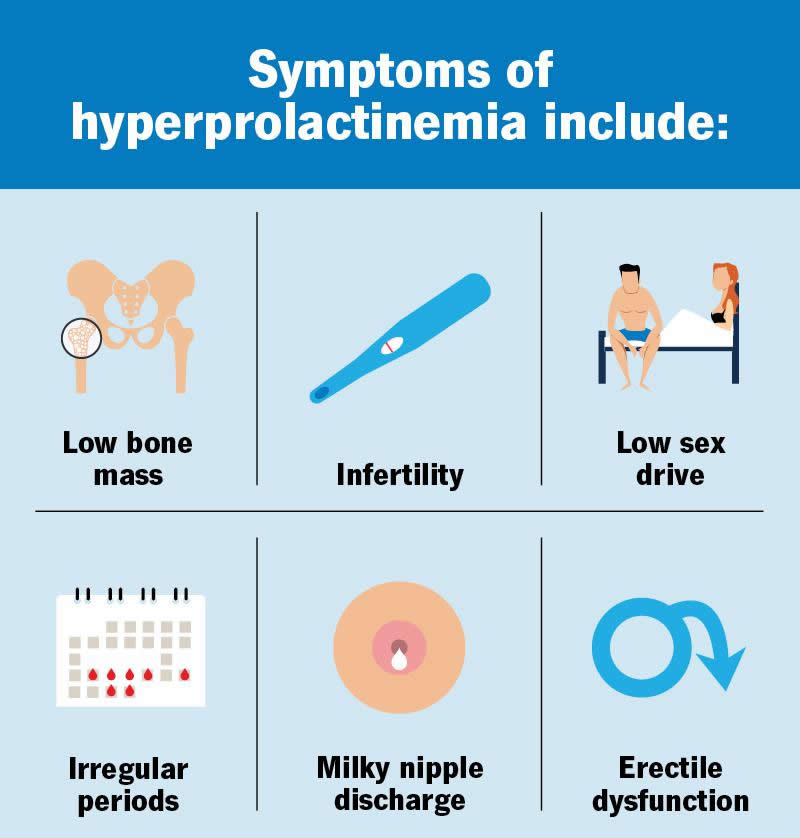Hyperprolactinemia
Hyperprolactinemia means you have high levels of prolactin in your blood. The most common cause is a prolactinoma, a benign (noncancerous) tumor in your pituitary gland. Certain health conditions and medications can also cause hyperprolactinemia.
Overview
What is hyperprolactinemia?
Hyperprolactinemia happens when you have high levels of prolactin in your blood. Prolactin is a hormone that’s responsible for breast tissue development and lactation.
Hyperprolactinemia isn’t life-threatening. But it can causeinfertility and other issues that can impact your quality of life. The good news is that it’s treatable.
How common is hyperprolactinemia?
Hyperprolactinemia affects less than 1% of the general population. Women are more likely to have the condition than men.
Symptoms and Causes

What are the symptoms of hyperprolactinemia?
Some people who have hyperprolactinemia have very mild or no symptoms (are asymptomatic).
For anyone, hyperprolactinemia can cause the following symptoms:
- Infertility
- Loss of interest in sex (low libido)
- Low bone mass (osteopenia)
- Milky discharge from your nipples when not pregnant or breastfeeding (galactorrhea)
For women, symptoms of hyperprolactinemia include:
- Changes in menstruation not related to menopause, like irregular periods or no periods
- Pain during penetrative sex due to vaginal dryness
For men, common symptoms of hyperprolactinemia include:
- Erectile dysfunction (ED)
- Low levels of testosterone
- Enlarged breast tissue (gynecomastia)
What causes hyperprolactinemia?
Several factors and conditions can cause hyperprolactinemia, including:
- Prolactinoma (a pituitary gland tumor)
- Other pituitary gland tumors
- Certain medications
- Certain health conditions
Sometimes, healthcare providers can’t find the cause. They call this idiopathic hyperprolactinemia. It usually goes away without treatment after several months.
Prolactinomas
A prolactinoma is the most common cause of hyperprolactinemia. A prolactinoma is a benign (noncancerous) tumor (adenoma). It forms in your pituitary gland. It causes excess production of prolactin.
Other pituitary gland tumors
Large tumors (other than prolactinomas) in or near your pituitary gland may cause hyperprolactinemia. This is usually because the tumor prevents dopamine from reaching your pituitary gland. Dopamine stops prolactin production.
Radiation therapy for tumors on or near your pituitary gland may also cause hyperprolactinemia.
Medications
The brain chemical dopamine helps suppress (stop) prolactin production. Any medication that affects dopamine production can make your prolactin levels rise.
Medications that can cause hyperprolactinemia include:
- Birth control pills
- Certain antipsychotic medications, like risperidone and haloperidol
- High blood pressure medications, like methyldopa and verapamil
- Medications that treat heartburn and gastroesophageal reflux disease (GERD) (H2 antihistamines)
- Medications that treat depression, like tricyclic antidepressants and SSRIs
- Medications that treat menopause symptoms, like estrogen therapy
- Medications that treat nausea and vomiting (antiemetics)
- Pain relievers that contain opioids
Your prolactin levels will usually return to normal three to four days after you stop taking the medication. Never stop taking a prescribed medication unless your healthcare provider tells you to.
Health conditions
Health conditions other than a prolactinoma that may cause hyperprolactinemia include:
- Chest wall injuries, like fractured ribs orsternum (breastbone)
- Chronic kidney disease
- Chronic liver disease
- Cushing disease
- Hypothyroidism (underactive thyroid)
- Shingles, especially if the rash or blisters are on your chest
- Polycystic ovary syndrome (PCOS)
What are the risk factors for hyperprolactinemia?
The only known risk factor for hyperprolactinemia is having multiple endocrine neoplasia (MEN) type 1 (MEN1). MEN1 is an inherited condition that can cause prolactinoma.
If you have a first-degree relative (biological sibling or parent) who has MEN1, you may want to get genetic testing. It might help screen for and catch a prolactinoma in its early phase.
Diagnosis and Tests
How is hyperprolactinemia diagnosed?
Your healthcare provider will start with a prolactin (PRL) blood test.
If your results show that you have hyperprolactinemia, the next step will be to determine the cause. Your provider may recommend additional testing, like other blood tests and imaging tests.
Management and Treatment
What is the treatment for hyperprolactinemia?
The treatment for hyperprolactinemia depends on its cause. If you have high prolactin levels but have few or no symptoms, you may not need treatment.
Treatment options for prolactinomas (the most common cause of hyperprolactinemia) include:
- Medication. Medications called dopamine agonists regulate your prolactin levels. They’re very effective in shrinking prolactinoma tumors. This is the most common form of treatment for prolactinomas.
- Surgery. If medication isn’t working to shrink your prolactinoma, you may need to have surgery to remove it.
- Radiation therapy. This is a rare third option for treating prolactinomas if other methods don’t work.
If a medication is causing hyperprolactinemia, your healthcare provider may prescribe a different one that doesn’t affect your prolactin levels as much.
Outlook / Prognosis
What is the prognosis for hyperprolactinemia?
The prognosis (outlook) for hyperprolactinemia is generally good. Treatment for its most common cause is usually effective.
Although hyperprolactinemia isn’t life-threatening, it can cause certain issues like infertility and irregular periods. Because of this, it’s important to receive treatment if you have hyperprolactinemia.
What questions should I ask my doctor?
If you have hyperprolactinemia, it may be helpful to ask your healthcare provider:
- What caused my case of hyperprolactinemia?
- What tests do I need?
- What are my options for treatment?
- What are the benefits and risks of each treatment option?
- Will my infertility go away after treatment for my hyperprolactinemia?
A note from Wockr
Hyperprolactinemia can affect your quality of life and cause infertility. The good news is that it’s highly treatable. If you’re experiencing symptoms of hyperprolactinemia, talk to your healthcare provider. They can run a simple blood test to see if your prolactin levels are elevated.